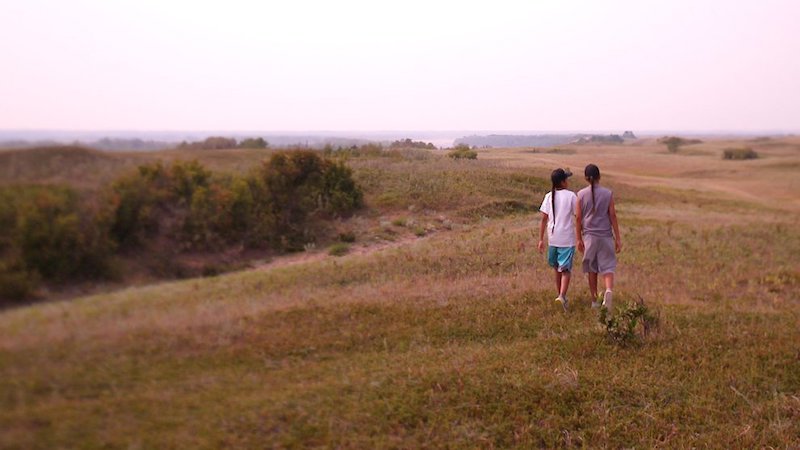nîpawistamâsowin: We Will Stand Up
|
Canada, 2019 (documentaire, 99 minutes, couleurs, cri / anglais)
|
|
Autre titre :
« nîpawistamâsowin : nous nous lèverons »
|

|
| Image : © Office national du film du Canada |
Description du film :
« Le 9 août 2016, un jeune Cri du nom de Colten Boushie est tué d'une balle dans la tête après être entré sur la propriété agricole de Gerald Stanley avec ses amis. L'acquittement de Stanley par le jury attire l'attention du monde entier, soulève des questions à propos de l'enracinement du racisme dans le système juridique du Canada et propulse la famille de Colten et sa quête de justice sur la scène nationale et internationale. Dans nîpawistamâsowin : nous nous lèverons, la réalisatrice Tasha Hubbard tisse un récit pénétrant fusionnant une réflexion sur sa propre adoption, la navrante histoire du colonialisme dans les Prairies et une vision transformatrice d'un avenir où les enfants autochtones peuvent vivre en sécurité sur leur terre natale. »
-- Office national du film du Canada
(source)
|
| Générique (partiel) : |
| Scénario : | Tasha Hubbard |
| Produit par : |
Tasha Hubbard, George Hupka, Jon Montes, Bonnie Thompson, Kathy Avrich-Johnson, David Christensen, Janice Dawe |
| Images : |
George Hupka |
| Animation : |
Justin Stephenson |
| Montage images : |
Hans Olson |
| Musique : |
Jason Burnstick |
| Société de production : |
Downstream Documentary Productions, National Film Board of Canada / Office national du film du Canada |
(sources)
Prix décernés à nîpawistamâsowin: We Will Stand Up
Notes sur nîpawistamâsowin: We Will Stand Up
- Tourné en Saskatchewan, à Ottawa, à Vancouver et à New York.
- Présenté au Hot Docs Canadian International Documentary Festival en 2019.
(sources)
Citations sur nîpawistamâsowin: We Will Stand Up [en anglais]
« As a scholar who teaches about the impact of colonial violence, [Tasha] Hubbard made the decision to insert her and her family's story into the film [nîpawistamâsowin: We Will Stand Up] to give more context about where she was coming from. She emotionally weaves the impact that Colten's death had on his family, her own family, while echoing the impact it made on the Indigenous community nation-wide. 'I kept looking at my son and nephew in the backseat thinking—where are we going? What is it going to be like for them when they get older?' she explained, 'It just felt so immediate. That's what prompted me to put those feelings that I had into the film.' »
-- Erica Commanda
(source)
« I openly wept many times during the watching of this film [nîpawistamâsowin: We Will Stand Up]. I could feel every word, every image, every video clip that was carefully delivered to me by [Tasha] Hubbard and her film team. I felt strong emotion not only for the story being told, but for the sense of loss I felt in my own Native blood. I felt the loss of ancestral families, the loss of language, the loss of my own relatives that I have never had the honor to meet. But Hubbard comforted me as well as she comforted her son and nephew when she looked at historical records in some museum's archives. 'We're here because the people that came before us loved us so much,' Hubbard says to her son and nephew. The moment was a gift to all Indigenous people, in my view. »
-- Vincent Schilling
(source)
Bibliographie sur nîpawistamâsowin: We Will Stand Up
Articles de journaux, de revues grand public ou de sites d'information en ligne
-
COMMANDA, Erica. « The Cost of Colten Boushie's Death in Tasha Hubbard's Nîpawistamâsowin: We Will Stand Up », Muskrat Magazine, 25 avril 2019.
[en anglais]
-
SCHILLING, Vincent. « 'nîpawistamâsowin: We Will Stand Up' is an emotional award-winning film: Colten Boushie documentary tells the story of his death and raises questions about Canadian justice », critique de nîpawistamâsowin: We Will Stand Up, Indian Country Today, 10 septembre 2019.
[en anglais]
Sites Web sur nîpawistamâsowin: We Will Stand Up


